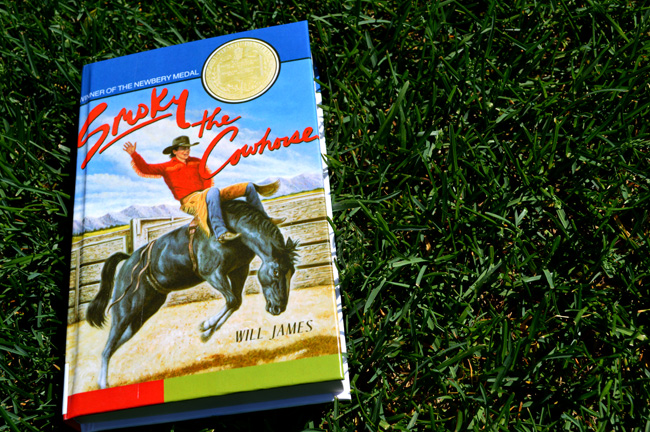This week we come to the 6th Newbery Winner from 1927: Smoky the Cowhorse by Will James. It reminded me of a mix between Black Beauty set in the American West and a Nature Channel special about a plains horse narrated by a Cowboy. It chronicles the life of the semi-wild horse Smoky from his first steps until the very end of his life. Like Black Beauty, our protagonist horse experiences the wide range of loving and abusive horse situations possible in that time when horses still were a main-mode of transportation.
What I liked. This week we (finally!) had a main character in a Newbery that I got really attached too. I have liked a few characters before (Phil from Dark Frigate, or Dr. Dolittle), but this was the first character that I really felt like we followed closely and got to know. We watched him face small and great hardships: learning to stand, identify coyotes, be a part of a wild herd, be caught and branded, fight with other horses, lose his mother, make a new family, learn to be saddled, herd cattle, trust a cowboy, be stolen, become a bucking bronco, become a horse for hire, and then almost starve to death under the hands of a neglectful owner. That being said, the last third of the book is a very bleak time for Smoky, and it was hard to see so much time pass when things were so hard for our little mouse-colored gelding.
What was interesting. The world of the cowhorse and the cattle driving cowboys is fully developed and fascinating throughout the book. There is all sorts of horse terminology: remuda, gelding, stud, stallion, filly, foal, mare, bronco, mustang, steeldust, and coach. Also there are great descriptions of cowboy life: “the foreman of the Rocking R outfit,” “riding circle, herd” and “night guard,” or “the chuck wagon, bed wagon and wood wagon.” The whole book has a very Western colloquial style, like an old cowboy telling you the legend of Smoky around the campfire: “ ‘Daggone it, Clint,’ says that hombre, ‘I was told you’d quit riding broncs–what in samhill do you call that spooky thing you’re setting on now?’” (p. 148)
What were some limitations. The limitations for me mainly center around the last third of the book. First, there are a lot of racist and derogatory terms around the horse thief and the vegetable man who abuse Smoky, and who are pretty much the only non-white characters in the book. And that section of the book, the dark and angry time in Smoky’s life, was a long section with little redemption. In the end, Clint, the only human Smoky has ever trusted and loved, spots Smoky and rescues him, taking him home to safe pastures. But even there, I felt that Smoky as our protagonist didn’t actively participate in his redemption. I wanted it to be more like Katherine Applegate’s The One and Only Ivan, with Smoky actively shaping the end.
Why I think it’s a Newbery. Smoky is a fun western horse tale, with a vivid cowboy world, and a lot of action: horse fights, cattle stampedes, bucking broncos, wolves, coyotes, cow thieves, and sheriffs locking up the bad guys in the end.
Similarity to other Newbery winners. We’ve finally gotten a Newbery that takes place in America, which is a shift from the more international/exoticized settings of the previous books (and we’ll go back to India next week with Gay Neck, the Story of a Pigeon). But we’ve still got some racism, and very few female characters in Smoky, which is like a lot of the early Newberies.
What it teaches me as a writer. I think that detailed world building, obviously coming out of the author’s first-hand experience working with horses and cattle, was one main take away from Smoky. I loved the description of the land, the animals, and the cowboy culture all in that distinct narrative voice. Also, I think that Smoky has some solid lessons about making sure that the dark night of your protagonist isn’t too long, and that he or she has to be a part of it coming to an end. The protagonist will likely need help and the circumstances to align fortuitously, but as an audience, we want to see the protagonists act, have learned something, and then to put that knowledge into an act of faith and bravery in the end.
What are your impressions of Smoky the Cowhorse? Do you have a favorite horse or western book?








